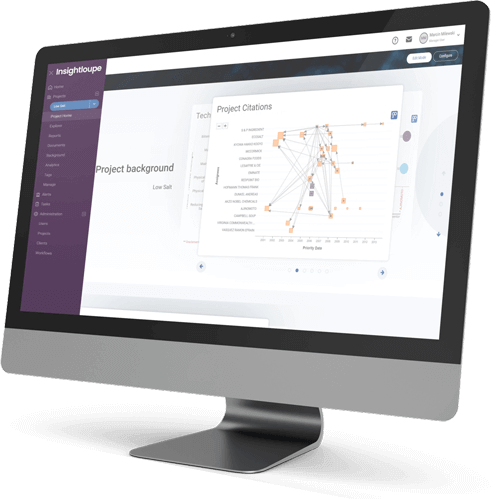Comprehensive Guide
Innovation Strategy Consulting
Transform your business with strategic innovation—unlock the path to sustainable growth and competitive advantage
Overview
Unlock your business's full potential with our comprehensive guide on Innovation Strategy Consulting. This guide helps organizations navigate innovation complexities, ensuring their strategies align with business goals for sustainable growth and competitive advantage.
Innovation Strategy Consulting systematically examines a company's innovation capabilities, opportunities, and risks. This process includes:
- Analyzing market trends and competitive landscape.
- Identifying and leveraging core competencies.
- Aligning innovation efforts with strategic business goals.
- Optimizing resource allocation for maximum impact.
Innovation strategy isn't just a formality but a strategic necessity. It is pivotal in managing innovative processes, especially in product development, market expansion, and operational efficiency. By engaging in Innovation Strategy Consulting, you comprehensively understand your organization's innovation potential, enabling you to make informed decisions and drive strategic growth.
Critical Components of Innovation Strategy Consulting
Understanding the importance of Innovation Strategy Consulting, let's examine the critical components of this process.
Market Analysis and Trend Identification
Understand market dynamics and identify emerging trends to stay ahead of the competition. This approach involves:
- Conducting thorough market research.
- Analyzing competitors' strategies.
- Identifying potential disruptions and opportunities.
Strategic Roadmapping
Create a clear, actionable roadmap for innovation that aligns with your business goals. This method involves:
- Defining short-term and long-term innovation objectives.
- Setting milestones and key performance indicators (KPIs).
- Developing detailed implementation plans.
Resource Allocation
Efficiently allocate resources to maximize the impact of innovation initiatives. This plan includes:
- Assessing current resource capabilities.
- Identifying gaps and areas for improvement.
- Allocating budget, personnel, and technology effectively.
Risk Management
Identify potential risks and develop strategies to mitigate them, ensuring smooth implementation of innovation strategies. This tactic involves:
- Conducting risk assessments.
- Developing contingency plans.
- Implementing risk mitigation strategies.
Performance Measurement
Establish metrics to track the success of innovation strategies and make necessary adjustments for continuous improvement. This procedure includes:
- Setting up performance monitoring systems.
- Regularly reviewing and analyzing performance data.
- Making data-driven decisions to optimize outcomes.
Our Approach
At the core of our Innovation Strategy Consulting services lies a comprehensive, data-driven approach tailored to each client's unique needs. Our methodology includes:
Assessment and Diagnosis
- Thoroughly analyze your current innovation capabilities and market position.
- Identify gaps and opportunities for improvement.
Strategic Planning
- Develop a customized innovation strategy that aligns with your business objectives.
- Create a detailed implementation plan with clear milestones and deliverables.
Execution and Implementation
- Support the execution of the innovation strategy with hands-on guidance and expertise.
- Provide training and resources to ensure your team can sustain the innovation efforts.
Monitoring and Optimization
- Continuously monitor the performance of innovation initiatives.
- Make data-driven adjustments to optimize results and achieve desired outcomes.
Innovation strategy consulting is pivotal in driving business transformation, enabling companies to stay competitive, and achieving sustainable growth. Companies can align their innovation efforts with strategic business goals by systematically analyzing market trends, allocating resources efficiently, and managing risks. The following table highlights the importance of innovation strategy across various industries, showcasing real-world examples of companies successfully leveraging innovative approaches to achieve significant outcomes.
|
Industry
|
Company
|
Innovation Strategy
|
Key Focus Areas
|
Outcome/Impact
|
|---|---|---|---|---|
|
Technology
|
Apple
|
Predictive consumer trend analysis in technology and user experience.
|
Market Analysis, Trend Identification, Strategic Roadmapping
|
Revolutionized the smartphone market with the iPhone, securing a dominant market position and brand loyalty.
|
|
Automotive
|
Tesla
|
Leveraging the trend towards sustainable transportation and electric vehicles.
|
Market Analysis, Resource Allocation, Risk Management
|
Became a leader in electric vehicles, driving the global shift towards sustainable mobility.
|
|
Retail
|
Amazon
|
Expansion into cloud computing with Amazon Web Services (AWS).
|
Strategic Roadmapping, Resource Allocation, Performance Measurement
|
AWS became the leading cloud services provider, significantly contributing to Amazon’s profitability.
|
|
Healthcare
|
Pfizer
|
Accelerated COVID-19 vaccine development through focused resource allocation.
|
Resource Allocation, Risk Management, Performance Measurement
|
Successfully developed and distributed the first widely approved COVID-19 vaccine, saving millions of lives.
|
|
Consumer Goods
|
Unilever
|
Commitment to sustainable sourcing of agricultural raw materials.
|
Strategic Roadmapping, Market Analysis, Performance Measurement
|
Achieved leadership in sustainability, enhancing brand reputation and consumer trust.
|
|
Finance
|
Goldman Sachs
|
Integration of AI for risk management and predictive analytics in trading.
|
Resource Allocation, Risk Management, Market Analysis
|
Improved decision-making and risk management, enhancing profitability and client satisfaction.
|
|
Entertainment
|
Netflix
|
Personalized content recommendation through advanced algorithms.
|
Performance Measurement, Strategic Roadmapping, Market Analysis
|
Increased user engagement and retention, driving global subscription growth.
|
|
Manufacturing
|
GE
|
Adoption of digital twins for predictive maintenance in industrial equipment.
|
Innovation Strategy, Resource Allocation, Risk Management
|
Reduced downtime and maintenance costs, enhancing operational efficiency and customer satisfaction.
|
Challenges in Innovation Strategy Consulting
Recognizing the critical components is essential, but we must also acknowledge the challenges that can arise during the consulting process.
The Complexity of Innovation
The diversity and complexity of innovation across different industries can significantly complicate the consulting process. Each sector may have unique requirements and challenges, making ensuring comprehensive and effective strategies difficult.
Resource Intensity
Conducting a thorough innovation strategy consultation is a resource-intensive endeavor that demands considerable time and expertise. The process involves detailed assessments of numerous aspects of innovation management, from idea generation to implementation strategies.
Keeping Up with Technology
Rapid technological advancements can quickly outpace existing innovation strategies, creating gaps that might expose the organization to risks. Engaging with technology experts and innovation professionals specializing in emerging technologies is beneficial.
Confidentiality Issues
Ensuring the secure management of sensitive information throughout the consulting process is crucial to protecting the integrity and value of innovative ideas and strategies.
Benefits of Innovation Strategy Consulting
Enhanced Innovation Management
Identify underutilized assets, uncover potential risks, and explore opportunities for better management or monetization.
Risk Mitigation
Early identification and resolution of vulnerabilities prevent potential innovation issues from becoming costly.
Informed Decision Making
A comprehensive overview of innovation capabilities facilitates strategic planning and execution.
See Insightloupe in Action
Master Innovation with Insightloupe
Unlock dynamic insights for R&D monitoring and IP management. With Insightloupe's powerful tools, simplify decisions, mitigate risks, and stay ahead.

How to Conduct Innovation Strategy Consulting - The D3 Framework Approach
Preparation
Define the scope and objectives of the consulting engagement and assemble a team of experts with legal and technical expertise.
Discover
Gather comprehensive information about the organization's innovation capabilities and practices. This system includes:
- Conducting interviews and surveys.
- Reviewing existing documentation and processes.
- Analyzing market and competitive data.
Design
Create solutions based on the discoveries made in the first phase. This process involves:
- Developing strategic recommendations.
- Creating detailed implementation plans.
- Designing new processes and systems.
Deploy
Implement the designed strategies and enhancements. This procedure includes:
- Executing the implementation plan.
- Providing training and support.
- Monitoring progress and making adjustments as needed.
Related Resources
Innovate. Transform. Grow.

Unleashing Innovation: Crafting a Future-Proof IP Strategy
Learn how to build a future-proof IP strategy to drive innovation and gain a competitive edge. Get expert advice on setting baselines, conducting IP audits, benchmarking competitors, crafting and executing IP strategies, and maintaining regular reviews for sustained growth. Secure your intellectual assets for market leadership.

Driving Innovation: Strategic Collaboration with Top Innovation Ecosystems in Pharma and Biotech
Discover how a global pharma and biotech leader revamped its innovation strategy through strategic partnerships with top innovation ecosystems. Explore the approach that boosted efficiency, agility, and strategic focus, making the company a preferred industry partner.

Revving Up the Future: How Smart Charging Drives the Electric Vehicle Revolution
Explore the evolution of electric vehicles (EVs) and the vital role of Smart Charging in their future. From Bertha Benz’s historic drive to today’s innovations, discover how integrated charging infrastructure is key to widespread EV adoption. Learn how Smart Charging optimizes power distribution and boosts sustainability in the automotive industry.
Talk to One of Our Experts
Start your transformation journey today—consult our experts and drive your business towards sustainable growth!